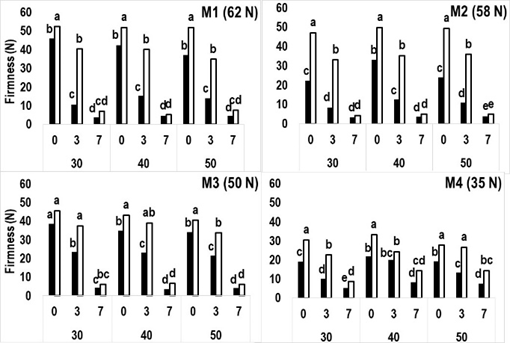Treatment with 1-MCP
an alternative to extend storage in plums harvested with advanced maturity
DOI:
https://doi.org/10.31285/AGRO.25.402Keywords:
ethylene, flesh color, harvest maturity, Prunus salicina, softeningAbstract
Maturity at harvest is a determining factor in fruit storage potential, especially in such perishable species as plums (Prunus salicina L.). However, harvest´s logistics is very complex, and a large percentage of fruits are harvested at a more advanced stage of maturity than the optimum recommended for long storage. Treatment with 1-MCP has shown to be effective in reducing the post-harvest deterioration rate of Japanese plums, but the effectiveness of this treatment may be reduced in late harvested fruit. The aim of this trial was to determine the efficiency of treatment with 0.4 µL L-1 of 1-MCP in Larry Ann plums harvested at 4 different maturity stages. The results showed that the treatment was effective in reducing the ripening rate of the fruit at all harvest timings. The duration of this effect and the number of parameters affected decreased as harvest was delayed. In maturity stage 1 (M1, ~62 N) and maturity stage 2 (M2, ~58 N), 1-MCP delayed ethylene production rate during shelf life after 30, 40, and 50 days of storage at 0 ºC and reduced loss of flesh firmness, and acidity. At the maturity stage 3 (M3, ~50N) 1-MCP delayed ethylene production rate during shelf life after 30 and 40 days of storage at 0 ºC and maintained higher flesh firmness values. In fruit harvested at the maturity 4 (M4, ~35 N), 1-MCP did not affect ethylene production rate, but reduced loss of flesh firmness during shelf life, supporting the hypothesis that the treatment has a direct inhibitory effect on softening enzymes, independent of ethylene.
Downloads
References
Abdi N, Holford P, Mc Glasson WB, Mizrahi Y. Ripening behaviour and responses to propylene in four cultivars of Japanese type plums. Postharvest Biol Tec. 1997;12:21-34.
Amorim L, Martins MC, Lourencio SA, Gutierrez ASD, Abreu FA, Goncalves FP. Stone fruit injuries and damage at the wholesale market of Sao Paulo, Brazil. Postharvest Biol Tec. 2008;47:353-7.
Candan AP, Graell J, Crisosto C, Larrigaudière C. Improvement of storability and shelf life of ‘Blackamber’ plums treated with 1-methylcyclopropene. Food Sci Technol. 2006;15:437-44.
Crisosto CH, Slaughter D, Garner D, Boyd J. Stone fruit critical bruising thresholds. Journal American Pomogical Society. 2001;55(2):76-81.
Di Rienzo JA, Casanoves F, Balzarini MG, Gonzalez L, Tablada M, Robledo CW. InfoStat [Internet]. Version 2011. Córdoba: Universidad Nacional de Córdoba, Facultad de Ciencias Agropecuarias; 2011 [cited 2021 Feb 05]. Available from: https://bit.ly/3dDvIyu.
Hoehn E, Gasser F, Naepflin B, Ladner J. Consumer expectations and soluble solids, acidity and firmness of plums (Prunus domestica ‘Cacaks Beauty’). Acta Hortic. 2005;(682):665-72.
Kader AA, Mitchel FG. Maturity and quality. In: La Rue JH, Johnson RS, editors. Peaches, plums and nectarines: growing and handling for fresh market. Davis (CA): UC Davis; 1989. p. 191-6. (Publication; 3331).
Khan AS, Singh Z. 1-MCP regulates ethylene biosynthesis and fruit softening during ripening of ‘Tegan Blue’ plum. Postharvest Biol Tec. 2007;43:298-306.
Martínez-Romero D, Dupille E, Guillén F, Valverde JM, Serrano M, Valero D. 1-Methylcyclopropene increases storability and shelf life in climacteric and nonclimacteric plums. J Agric Food Chem. 2003;51:4680-6.
Neri F. Influence of maturity stage and ripening on sensory quality of peaches, necatrines and plums. In: Eufrin Workshop on fruit quality. Bologna: EUFRIN; 2003. p. 141-2.
Watkins CB.The use of 1-methylcyclopropene (1-MCP) on fruits and vegetables. Biotechnol Adv. 2006;24:389-409.

Published
How to Cite
Issue
Section
| Article metrics | |
|---|---|
| Abstract views | |
| Galley vies | |
| PDF Views | |
| HTML views | |
| Other views | |















